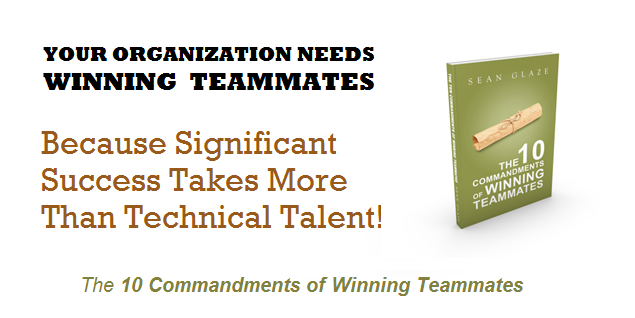 There is a 5 word phrase that dooms your team interactions.
There is a 5 word phrase that dooms your team interactions.
I have written before about how to benefit from the working with a “sandpaper person” on your team, and have also discussed the conflicts that can arise if your people are not aware of the strengths and challenges that different team personality types offer.
But there is an issue even more dangerous to your team than either of those circumstances, and it involves a specific set of words that some people on your team may have been thinking or even saying out loud.
The good news is that the condition is treatable. The bad news is that often the people who suffer from the effects of this condition often do not realize the negative effects of their affliction.
Of course, the “condition” that I am referring to is a repeated use and belief in a 5 word phrase that absolutely dooms team interactions and individual improvement.
It is a phrase that you must never allow to be spoken – unless it is followed by a swift and passionate rebuttal. Your silence would imply consent, and that would be devastating to your organization’s future.
The 5 word phrase you need to train your ears to catch and correct is “that’s just how I am…”
Think about that for a moment.
“That’s just how I am” is a disturbingly common comment that becomes an excuse for poor team interactions and destructive behavior.
Maybe you know someone who has used that phrase following a particularly unprofessional moment, where they said or did something that could really have no rational justification.
That phrase is dangerous because it implies that they are not responsible for their actions.
But only victims give away control.
Only “bad” teammates refuse to accept responsibility for their situation – or for their ability to change. Individual improvement only occurs when we acknowledge ownership of a behavior that we have the power to modify.
Anyone saying “that’s just how I am” is seeking to explain away a lack of competence or a lack of concern for others – and neither of those can be tolerated by high performing teams.
Instead of allowing a teammate to lock him or herself inside a box and suffer (or inflict suffering) because they feel unable to break out of the habit of that behavior, it is important to convince the person to recognize that interactive tendencies and default behaviors CAN be changed.
It doesn’t mean it will be easy or immediate, but it will most certainly be worth it, and with effort we can re-invent and improve ourselves.
Awareness is the key, but it will be their commitment to take different actions and apply that awareness that has the impact on your team interactions and their own individual improvement.
No one on your team is designed to be rude or destined for insensitivity.
We are who and where we chose to be…
If you have taken personality assessments, the information on team personality types are intended to educate, and are not intended to excuse or permanently define their behaviors. Assessments offer an awareness of our default behaviors and tendencies, but we remain responsible for the consequences of our actions and must claim responsibility for how our behaviors influence others.
If you are familiar with the DISC profiles, it is common for a “D” personality type to be a dominant hard-driving goal oriented person who neglects to consider the emotional impact of his or her decisions or passion for achieving that goal.
But that is not an excuse for poor behavior. It is a very valuable insight into their strengths (decision making and determination), and also a valuable insight into their area of weakness.
Conversely, a type “S” person whose default behaviors are to remain steady, calm, and concerned with diplomacy must not allow him or herself to be shackled by the limitations of those tendencies and let worries keep them from making decisions.
Personality Types are Not an Excuse for Poor Behavior.
If you have ever heard yourself say, internally or out loud, “that’s just how I am,” then I urge you to consider the impact that kind of thought has on your interactions and individual improvement.
One of the greatest predictors of success, according to Angela Lee Duckworth in her Ted Talk, is Grit – and grit is best developed in people who see failures as simply feedback to inform and improve their future efforts.
Thinking “that’s just how I am” is a death sentence for success, because it presupposes an inability to make better decisions and change behaviors to impact future outcomes.
If your team is stressed, struggling to have productive interactions, or simply in need of a morale-boosting experience to build stronger connections, you may want to consider a corporate or teacher team building event to inspire the laughter and lessons your group needs.
When anyone on your team is heard saying that 5 word phrase, be sure to correct him or her with a smile and a reminder that we are how we choose to be.
Culture is created one conversation at a time.
Grow your team by creating a culture where those 5 words aren’t used together.
Winning Teammates care enough to call others out when they hear damaging comments, and always begin by being a person that others should emulate.
Take responsibility for continually working to be a better teammate by modifying your own internal conversations and behaviors. Work to make your interactions encouraging and positive by removing “victim thinking” from your mind…
And when you stumble, remember that you are not doomed to repeat that behavior.
That’s NOT just how you are!
Each day you can choose to be a better version of yourself – and that means that YOU have a tremendous impact on your team’s improvement.

